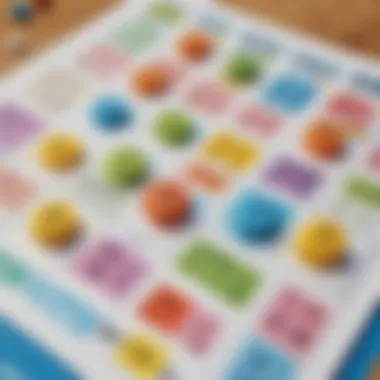Engage Kindergarteners with Interactive Math Games: Enhance Learning


Fun Activities Ideas
When it comes to interactive math games for kindergarteners, fun activities play a crucial role in engaging young learners. From indoor activities to outdoor adventures, arts and crafts, science experiments, and even cooking and baking, there are various avenues to make learning enjoyable. Indoor activities can include scavenger hunts to find mathematical shapes or counting activities using household items. On the other hand, outdoor adventures can involve nature walks to collect leaves for counting exercises or hopscotch games to practice number recognition. Arts and crafts provide opportunities to create math-centric projects like number collages or patterned bracelets. Science experiments can involve measuring ingredients for baking or observing how shapes fit together like puzzle pieces. Cooking and baking activities can incorporate counting measurements or dividing ingredients into equal portions to enhance math skills in a practical and exciting manner.
Introduction
In this article, we delve into the fascinating realm of Interactive Math Games for Kindergarten, focusing on innovative ways to enhance learning for young minds. The significance of this topic lies in its ability to revolutionize traditional math education by infusing it with experiential and engaging activities. By leveraging active math games, educators can create a dynamic learning environment that captivates children's attention and fosters a deep understanding of mathematical concepts.
Overview of Kindergarten Math Education
Key objectives of teaching math in kindergarten
Exploring the key objectives of teaching math in kindergarten unveils a foundational element essential for a child's cognitive development. These objectives encompass not just numerical skills but also critical thinking, problem-solving, and logical reasoning. By focusing on fundamental concepts such as number recognition, counting, and basic operations, kindergarten math education sets the stage for future academic success. The strategic emphasis on building a robust math foundation in early childhood is a cornerstone of educational practices worldwide, ensuring children's readiness for more advanced mathematical challenges.
Importance of early math skills development
The importance of early math skills development cannot be overstated, as it forms the bedrock of a child's numeracy abilities. Cultivating these skills from a young age not only enhances academic performance but also nurtures a child's confidence in tackling mathematical tasks. Early exposure to math fosters a positive attitude towards the subject, paving the way for lifelong learning and skill mastery. While there may be challenges associated with introducing complex concepts at a young age, the benefits far outweigh any initial difficulties, establishing a strong mathematical proficiency that serves children well into their academic journey.
Benefits of Active Learning in Mathematics


Enhanced retention and understanding
Active learning in mathematics offers a multifaceted approach to boosting retention and comprehension of mathematical principles. By engaging children in hands-on activities, such as interactive math games, educators create an immersive learning experience that enhances memory recall and concept retention. The dynamic nature of these activities ensures that children actively participate in their learning process, reinforcing their understanding of mathematical concepts through experiential practice.
Improved problem-solving abilities
One of the key advantages of active learning in math is the cultivation of problem-solving skills. Through interactive games that present math challenges in a playful format, children develop critical thinking abilities and learn to approach problems with creative solutions. This iterative process of trial and error builds resilience and adaptability in young learners, empowering them to tackle increasingly complex mathematical problems with confidence and ingenuity.
Active Math Games for Kindergarten
Active Math Games for Kindergarten play a vital role in enhancing the learning experience for young learners in this article. By immersing children in hands-on mathematical activities, we can cultivate a love for numbers and problem-solving from an early age. These games not only make learning fun but also aid in the development of essential math skills crucial for future academic success. Through engaging with interactive math games, children can enhance their numeracy skills, spatial awareness, and logical thinking abilities, setting a strong foundation for continued learning.
Counting Games
Number recognition activities
Number recognition activities are a key component of math education for kindergarteners. By focusing on developing children's ability to identify and associate numbers with quantities, these activities lay the groundwork for more advanced mathematical concepts. The interactive nature of number recognition activities fosters a deep understanding of numerical relationships, encouraging children to develop their numeracy skills in a fun and engaging manner. Incorporating number recognition activities in this article adds value by promoting foundational math comprehension in young learners.
One-to-one correspondence games
One-to-one correspondence games are instrumental in honing children's counting abilities and understanding of quantity. These games emphasize the relationship between numbers and objects, helping children grasp the concept of one-to-one matching. By engaging in one-to-one correspondence games, kindergarteners enhance their counting accuracy and develop a solid foundation for more complex math operations. The unique feature of these games lies in their ability to make abstract mathematical concepts tangible, offering a hands-on approach to learning numbers.


Shapes and Patterns Activities
Matching shapes games
Matching shapes games provide kindergarteners with the opportunity to refine their spatial recognition skills and logical thinking abilities. By engaging in activities that require matching shapes based on similarities, children enhance their visual perception and pattern recognition. These games foster a deeper understanding of geometric concepts while encouraging creativity and problem-solving skills. The interactive nature of matching shapes games makes them a popular choice for this article, as they promote critical thinking and geometric awareness in young learners.
Creating and extending patterns
Creating and extending patterns activities challenge children to identify, replicate, and expand upon various mathematical sequences. By exploring the underlying structure of patterns, kindergarteners develop their ability to predict and analyze visual sequences. These activities not only stimulate creativity but also enhance mathematical reasoning and concentration. The unique feature of creating and extending patterns lies in their capacity to develop children's pattern recognition skills, setting the stage for more advanced math concepts.
Measurement and Comparisons
Estimation games
Estimation games offer kindergarteners a hands-on approach to developing their spatial awareness and numerical estimation skills. By engaging in activities that require children to make educated guesses and approximations, these games challenge their ability to assess quantities accurately. The key characteristic of estimation games is their emphasis on developing children's number sense and critical thinking. By incorporating estimation games in this article, we provide young learners with opportunities to refine their mathematical intuition and problem-solving abilities.
Size sorting activities
Size sorting activities involve categorizing objects based on their dimensions, fostering children's understanding of relative sizes and comparisons. By engaging in size sorting activities, kindergarteners improve their ability to classify objects according to specific criteria, developing their logical reasoning and spatial organization skills. The unique feature of size sorting activities is their focus on visual discrimination and categorization, providing children with a multi-sensory learning experience that promotes mathematical understanding and order.


Implementing Active Math Games: In the realm of early childhood education, implementing active math games holds a pivotal role. These activities transcend conventional teaching methods by infusing play and discovery into educational settings. By immersing kindergarteners in hands-on experiences, educators can cultivate a deep understanding of mathematical concepts while fostering a love for learning. The implementation of active math games nurtures critical thinking, problem-solving skills, and spatial awareness in young minds. This section delves into the core strategies and considerations essential for successfully integrating interactive math games into a kindergarten curriculum.
Incorporating Games into Daily Routine:
Balancing play and structured learning: Balancing play and structured learning is a fundamental aspect of early childhood education. By seamlessly blending free play with structured academic tasks, children can engage in meaningful exploration while developing foundational mathematical competencies. The key characteristic of this approach lies in its ability to nurture both creativity and cognitive skills simultaneously, enriching the educational experience for young learners. Balancing play and structured learning offers a dynamic framework that promotes holistic development and heightened engagement during math activities.
Creating a math-rich environment: Creating a math-rich environment is paramount in enhancing mathematical understanding among kindergarteners. This approach involves establishing a space that is teeming with numeracy opportunities, from math manipulatives to educational posters. The key characteristic of a math-rich environment is its immersive nature, wherein mathematics seamlessly integrates into all aspects of a child's surroundings. By immersing students in a mathematically stimulating setting, educators can cultivate a deep appreciation for numbers and patterns, fostering a curious and inquisitive attitude towards mathematical exploration.
Engaging Parents and Educators:
Communicating the benefits of active math games: Effective communication regarding the advantages of active math games is essential for garnering parental and educator support. By highlighting how these interactive activities enhance children's mathematical proficiency and critical thinking skills, stakeholders can recognize the value of such initiatives. The key characteristic of this communication strategy lies in its ability to elucidate the immediate and enduring benefits of incorporating active math games into a child's learning journey. By conveying the positive impact of these games, parents and educators can actively promote their integration into daily academic routines, fostering a cohesive learning environment that nurtures mathematical growth.
Encouraging involvement in at-home practice: Encouraging parents to engage in math-based activities at home plays a crucial role in reinforcing classroom learning. By empowering parents to incorporate mathematical games and exercises into daily routines, children can experience a seamless continuity between school and home environments. The key characteristic of this involvement lies in its capacity to strengthen familial bonds through shared learning experiences, thereby promoting a collaborative approach to nurturing young minds. By encouraging at-home math practice, parents and educators support the consolidation of mathematical skills outside traditional academic settings, facilitating comprehensive skill development and enhancing overall mathematical proficiency.
Conclusion
In this comprehensive guide on Interactive Math Games for Kindergarten, the importance of concluding on a high note cannot be overstated. By summarizing the key points discussed throughout the article, the Conclusion serves as a catalyst for reflection and reinforcement of the benefits of using active math games in early childhood education. Through this final section, readers can gain a nuanced understanding of the transformative power of incorporating interactive math games into the learning process.
Fostering a Love for Math through Play
Building a strong foundation for future learning
Exploring the realm of 'Building a strong foundation for future learning' within the context of early math education uncovers a pivotal aspect that fuels the fundamental growth of young minds. By honing in on essential math concepts through engaging activities, this subsection propels children towards a lifetime of numerical proficiency. The characteristic that sets 'Building a strong foundation for future learning' apart lies in its ability to scaffold math skills progressively, ensuring a seamless transition to more complex mathematical concepts. As a popular choice in this article, it delivers comprehensive knowledge in a manner that captivates and educates young learners effectively. The unique feature of 'Building a strong foundation for future learning' is its emphasis on laying a concrete base for advanced math learning, thereby preparing children for future academic challenges. While promoting conceptual clarity and critical thinking skills, it also lays the groundwork for a deeper appreciation of mathematical concepts.
Instilling confidence and enthusiasm in young learners
Unpacking the significance of 'Instilling confidence and enthusiasm in young learners' sheds light on a transformative element that heightens the learning experience. This aspect contributes immensely to the overarching goal of nurturing a love for math through play. By boosting self-assurance and fostering a positive attitude towards math, children are empowered to tackle mathematical tasks with eagerness and assurance. The key characteristic of 'Instilling confidence and enthusiasm in young learners' is its role in cultivating a resilient mindset that views challenges as opportunities for growth. This choice resonates as beneficial within this article due to its ability to inspire a sense of curiosity and exploration in young learners, fueling their passion for mathematical discovery. The unique feature of 'Instilling confidence and enthusiasm in young learners' is its capacity to foster a supportive learning environment where mistakes are viewed as stepping stones to success, instilling a sense of resilience and determination. While promoting a growth mindset and a love for problem-solving, it also instills in children the belief that math can be exciting and fulfilling.



